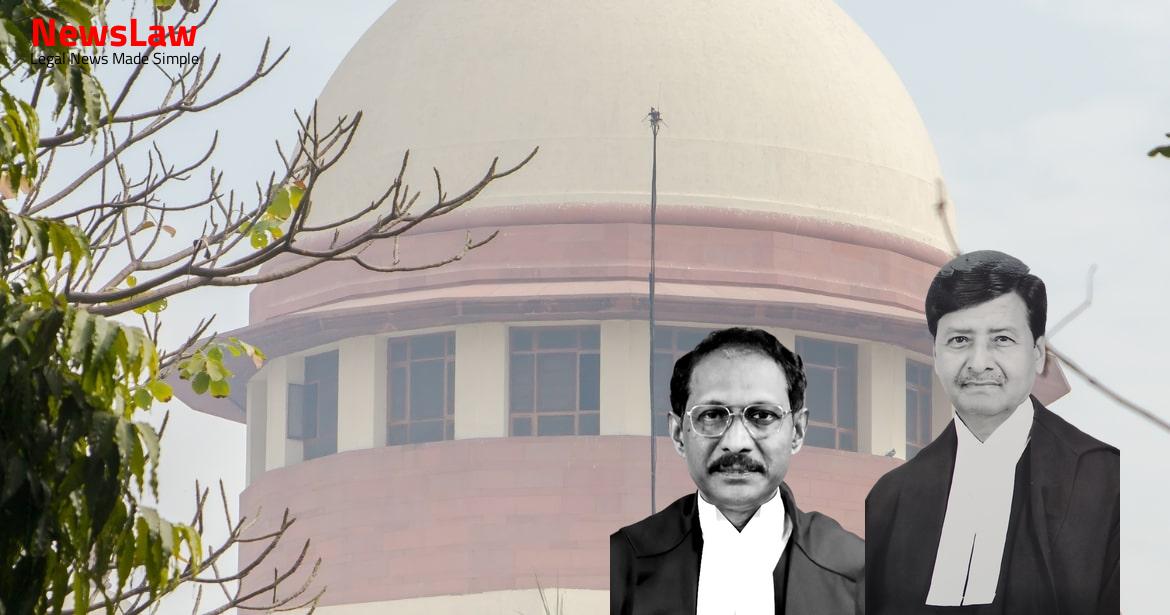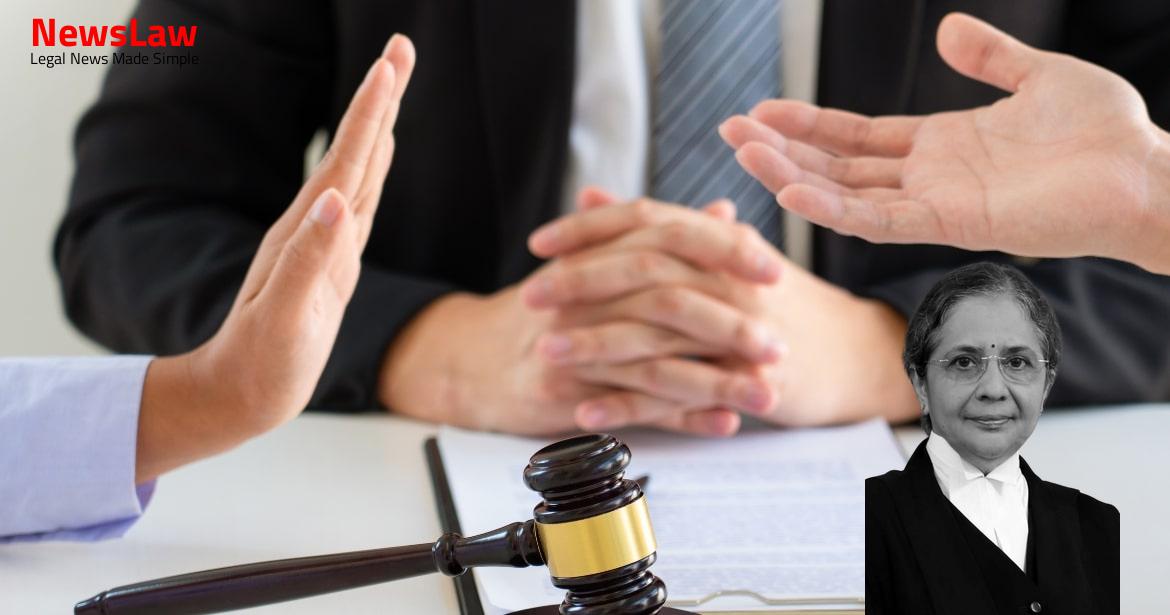As per the impugned judgment, the High Court of Judicature at Bombay, Nagpur Bench in Criminal Application (APL) No.841 of 2019 dated 20.04.2021 quashed FIR No.185 of 2019 dated 12.04.2019 of Rajura Police Station and the final report filed thereon under Section 173(2),
Cr.P.C. Chandrapur, for the offences under Section 376(1)(AB of the Indian Penal Code, 1860, Section 4 and 6 of POCSO Act, Section 3(1)(w) and 3(2)(v) of the Scheduled Castes and Scheduled Tribes (Prevention of Atrocities) Act, 1989 and Section 3 of the Maharashtra Prevention and Eradication of Human Sacrifice and other Inhuman, Evil and Aghori Practices and Black Magic Act, 2013. According to the appellant, on 06.04.2019 the said officer received a telephonic information from Chhaban Pandurang Pachare, the Superintendent of the said hostel which is under the control of the Integrated Tribal Development Project, Chandrapur that one girl studying in the 3 standard and another studying in the 5 standard, of the said school were not keeping well. Now, reverting to the case of the appellant, it is to the effect that during the investigation, Superintendent of the aforementioned hostel and four others, namely, Narendra Laxmanrao Virulkar, Sau Neeta alias Kalpana Mahadeo Thakare, Sau Lata Madhukar Kannake, Venkateswami Bondaiyaa Jangam were arrested and arraigned as accused in the crime. The investigation revealed that the respondent had knowledge about the incidents occurred, from the victims themselves as the victim girls revealed in their statements recorded under Section 161 of Cr.P.C.
Before considering the merits of the challenge against the impugned judgment whereby and whereunder the stated FIR and the chargesheet were quashed, we think it appropriate to refer to certain aspects and also the position with respect to scope of exercise of power under Section 482 Cr.P.C.
State of Punjab, held that the High Court could not embark upon an enquiry as to whether the evidence is reliable or not while exercising the power under Section 482 Cr.P.C. , this Court held that the inherent power under Section 482 Cr.P.C. Radhika and Another, a two Judge Bench of this Court held thus: “…plenitude of the power under Section 482 Cr.P.C.
Article 15 of the Constitution, inter alia confers powers upon the State to make special provisions for children and Article 39 (f) provides not only that the State shall direct its policy towards securing that the children are given opportunities to develop in a healthy manner and in conditions of freedom and dignity but also to ensure that their childhood and youth are protected against exploitation and against moral and material abandonment. True that under Section 21 (1), failure to report the commission of an offence under Sub-Section 1 of Section 19 or Section 20 or failure to report such offence under Sub-Section 2 of Section 19 has been made punishable with imprisonment of either description which may extend to six months or with fine or with both. Looking at the penal provisions referred above, making failure to discharge the obligation under Section 19 (1) punishable only with imprisonment for a short duration viz., six months, one may think that it is not an offence to be taken seriously. The non-reporting of the crime by anybody, after having come to know that a minor child below the age of 18 years was subjected to any sexual assault, is a serious crime and by not reporting they are screening the offenders from legal punishment and hence be held liable under the ordinary criminal law and prompt action be taken against them, in accordance with law.” Articles 3 (2) and 34 of the Convention have placed a specific duty on the State to protect the child from all forms of sexual exploitation and abuse.
Section 27 (1) of the POCSO Act provides that medical examination of a child in respect of whom any offence has been committed under the said Act, shall, notwithstanding that a First Information Report or complaint has not been registered for the offence under the Act, be conducted in accordance with Section 164 A of the Cr.P.C., which provides the procedures for medical examination of the victim of rape.
Failure to report regarding the commission of the offence under the POCSO Act despite knowledge about the same is the accusation against the respondent revealed from the charge-sheet. Pandita, this court held that while considering the question of quashing of FIR the High Court would not be entitled to appreciate by way of sifting the materials collected in course of investigation including the statements recorded under Section 161, Cr.P.C. Finding that the conclusion of the High Court to quash the criminal proceedings in that case was on the basis of its assessment of the statements recorded under Section 161 Cr.P.C., it was held that statements thereunder, being wholly inadmissible in evidence could not have been taken into consideration by the Court while adjudicating a petition filed under Section 482 Cr.P.C. It was also held that the High Court committed an error in quashing the proceedings by assessing the statements recorded under Section 161 Cr.P.C. Thus, a bare perusal of the above recitals extracted from paragraph No.10 of the impugned judgment would reveal that the High Court had gone through the statements of victims/witnesses cited by the prosecution, to arrive at the conclusion as to the existence or otherwise of evidence against the respondent. The very case of the Appellant is that some among the seventeen victims have given statements under Section 161, Cr.P.C. Be that as it may in view of the decision in Shankar Kisan Rao Khade’ s case (supra) holding non-reporting of such a crime as serious and in view of the position obtained from a conjoint reading of Sections 19(1) and 21 of POCSO Act, such persons are also liable to be proceeded with, in accordance with law.
Also Read: https://newslaw.in/supreme-court/c-a-no-000104-2020/
This Court was considering the expression ‘knows or has reason to believe’ occurring under Section 471, IPC and while explaining the meanings of the words “knowledge” and “reason to believe” this Court held: – ‘9. –
A person is said to have ‘reason to believe’ a thing, if he has sufficient cause to believe that thing but not otherwise.”
In the case on hand, the High Court arrived at the finding of absence of evidence to implicate the respondent in the crime in question upon going through the statements of the victims and also the statement of the teacher of the victims, which recourse is absolutely impermissible.
In the light of the circumstances available as above and in the light of Section 59 of the Evidence Act, the High Court was not justified in bringing abrupt termination of the proceedings qua the respondent. (Ajay Rastogi)……………………, J.
Case Title: THE STATE OF MAHARASHTRA Vs. MAROTI (2022 INSC 1152)
Case Number: Crl.A. No.-001874-001874 / 2022



